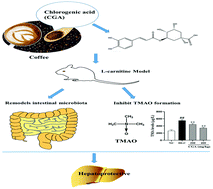Chlorogenic acid inhibits trimethylamine-N-oxide formation and remodels intestinal microbiota to alleviate liver dysfunction in high l-carnitine feeding mice
Abstract
High L-carnitine ingestion has been shown to cause liver injury, mechanically due to an elevated circulating level of trimethylamine-N-oxide (TMAO), a gut microbiota-derived metabolite from L-carnitine. This study aimed to investigate whether chlorogenic acid (CGA), a health-promoting polyphenol, could inhibit TMAO formation and thereafter might prevent L-carnitine-induced liver injury in mice. Feeding of mice with 3% L-carnitine in drinking water increased the serum and urinary levels of TMAO (p < 0.01 vs. Normal), whereas the serum and urinary TMAO formation was sharply reduced by CGA administration (p < 0.01). At the phylum level, CGA inhibited the L-carnitine-induced increase in the abundance of Firmicutes and Proteobacteria, while it promoted Bacteroidetes. At the genus level, CGA notably increased the abundance of Akkermansia and Bacteroides, but reduced the population of Erysipelatoclostridium, Faecalibaculum and Erysipelotrichaceae in high L-carnitine feeding mice. Meanwhile, CGA caused strong inhibition against the increase of liver injury markers (i.e. AST, ALT and ALP), hepatic inflammatory cytokines (i.e. IL-1, IL-6, TNF-α and TNF-β) and dyslipidemia (i.e. TC, TG, LDL-C and HDL-C) in L-carnitine-fed mice (p < 0.05). These findings suggest that CGA holds great potential to alleviate liver dysfunction induced by high L-carnitine ingestion. The beneficial effect might be attributed to the protection against TMAO formation and the improvement of the health-promoting gut microbiota, as well as the antioxidant and anti-inflammatory properties of CGA.



 Please wait while we load your content...
Please wait while we load your content...